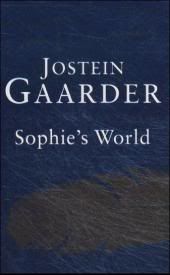
I am reading Jostein Gaarder's SOPHIE'S WORLD right now. I've been reading it for almost 10 months. No, I am not a sloooow reader. It's just that after reading the first few chapters, I got bored. But I've wanted to read it for the longest time, that I think I owe it to myself and the person who gave it to me (after I asked for it), to simply finish it.
I do like Sophie Amudsen's story, but I find the Philosophy lectures boring. I loved Philosophy when I was in AdMU but I think the way Gaarder presented it was cumbersome. I thought that she subtly put it in Philosophy tidbits within the main story. But that is not the case. Somebody has mentioned that it might be the fault of the translator. But I think not. It has something to do with the format, the flow of the novel itself It was structured in such a way that I think I am reading two books, a fiction novel and a Philosophy textbook.
My disappointment might also stem from my total love for Gaarder’s Solitaire Mystery.
I don't think I already have the right to pass final judgment on this book. I have to finish the book to justifiably do that. So for the mean time, bear with me if I rant more about it.
For more about Sophie's World, read these reviews here, here and here. You may also join this discussion project. And the latest blog posts about Sophie's World are here and here.
1 comment:
Sophie's World is a philosophy lecture badly disguised as a novel, and it manages to screw both goals. The lectures aren't boring, to me, but they're pretty superficial. The story itself, with a twist near the end, isn't even worth the paper it is printed on. None of the characters show any depth or individuality, they're all just sock puppets, cardboard cutouts whose sole purpose is to mouth off bite-sized servings of philosophy.
As a philosophy writer, Gaarder shows very little skill in enticing his readers' attention (as you have noted). You can get better treatments of the subject with popular books on the history of philosophy, such as Will Durant's Story of Philosophy, which was written in 1926. Gaarder's gimmick for success, it seems, is to make his unremarkable retelling of the history of philosophy as a work of fiction.
If you like philosophy, you might like Sophie's World. But if you already know who the philosophers are and what they wrote, then Sophie's World adds nothing. I myself cannot recommend it to anyone, unless he or she is philosophically obtuse and could use a little education, and even then I'd recommend it grudgingly.
Post a Comment